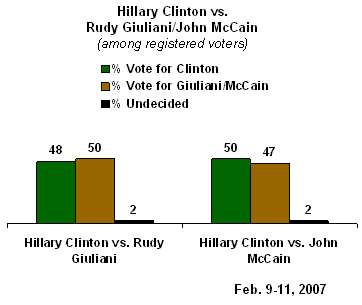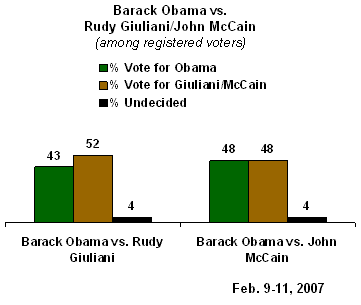GALLUP NEWS SERVICE
PRINCETON, NJ -- Three of the four current frontrunners for the Democratic and Republican nominations for president in 2008 can each credibly claim they would give their political party as good a chance as anyone of winning the general election next year. That is no minor point, as Gallup polling suggests voter perceptions of the candidates' national viability could be a crucial factor in determining who they throw their support to.
According to the new USA Today/Gallup poll, conducted Feb. 9-11, 2007, both frontrunners for the Republican nomination (Arizona Sen. John McCain and former New York City mayor Rudy Giuliani) are nearly tied with the Democratic frontrunner (New York Sen. Hillary Clinton) in hypothetical match-ups for the 2008 fall election. Whether voters are asked to choose between Clinton and McCain or Clinton and Giuliani, the race is within three points.
Clinton leads McCain by three points, 50% vs. 47%, while Clinton trails Giuliani by two points, 48% vs. 50%. However, given the margin of sampling error for the survey, those leads are not significant.

By contrast, the second-place contender for the Democratic nomination -- Illinois Sen. Barack Obama -- fares about as well as Clinton does against McCain (tying with him at 48%), but he trails Giuliani by a significant nine-point margin: 43% to 52%.

Democratic and Republican nomination preferences are fully discussed in another article on galluppoll.com. (See "Clinton, Giuliani Lengthen Leads in Presidential Nomination Trial Heats" in Related Items.)
Obama Loses Democrats to Giuliani
When voters are asked to choose between Obama and Giuliani, only 69% of Democrats and Democratic leaners say they would vote for Obama, while 28% say they would vote for Giuliani. By contrast, 79% of Democrats prefer Clinton when she is matched against Giuliani.
|
Democratic Preferences in 2008 General Election Trial Heats |
||
|
Vote Democratic |
Vote Republican |
|
|
% |
% |
|
|
Clinton vs. McCain |
81 |
18 |
|
Clinton vs. Giuliani |
79 |
19 |
|
Obama vs. McCain |
73 |
24 |
|
Obama vs. Giuliani |
69 |
28 |
This Democratic defection against Obama largely explains why Obama is currently the weaker opponent for Giuliani than is Clinton. Among all voters, Giuliani beats Obama by nine points, but he leads Clinton by two points, 50 to 48.
Republican preferences in a race that includes Giuliani are about the same, regardless of whether his Democratic opponent is Clinton or Obama. Giuliani is supported by 88% of Republicans when he is matched with Clinton and by 85% of Republicans when matched with Obama.
Republicans are most likely to back their party's nomination in a Clinton vs. Giuliani race (88% would vote for Giuliani); they are least likely to vote Republican when the race is between Obama and McCain (80% would vote for McCain).
|
Republican Preferences in 2008 General Election Trial Heats |
||
|
Vote Democratic |
Vote Republican |
|
|
% |
% |
|
|
Clinton vs. McCain |
15 |
84 |
|
Clinton vs. Giuliani |
11 |
88 |
|
Obama vs. McCain |
18 |
80 |
|
Obama vs. Giuliani |
13 |
85 |
The Electability Factor
Voter perceptions of a candidate's chances of winning in the general election appear to be influential in their choice of candidate to support for their party's nomination.
In January 2004, Gallup asked Democrats "Which type of candidate would you prefer to see the Democrats nominate for president in 2004 1) A candidate who agrees with you on almost all of the issues you care about but does not have the best chance of beating George W. Bush, or 2) A candidate who has the best chance of beating George W. Bush, but who does not agree with you on almost all of the issues you care about?"
The results were unambiguous. When forced to choose, 6 in 10 Democrats (60%) said they would rather support a candidate for the nomination with the best chance of beating Bush. Only 36% opted for the candidate who comes closer to sharing their views, but does not have the best chance of winning.
In a late January 2007 Gallup poll, the frontrunners of both parties (Clinton for the Democrats and Giuliani for the Republicans) are generally perceived by members of their own parties as being more likely to succeed in the general election.
- Forty-four percent of Democrats and Democratic-leaning independents say Clinton has the best chance of beating the Republican nominee in the 2008 general election, compared with only 27% choosing Edwards and 21% choosing Obama on this dimension.
- On the Republican side, Giuliani leads McCain, 55% to 38%, as the candidate perceived to be more likely to win next fall.
Survey Methods
Results are based on telephone interviews with 1,006 national adults, aged 18 and older, conducted Feb. 9-11, 2007. For results based on the total sample of national adults, one can say with 95% confidence that the maximum margin of sampling error is ±3 percentage points. In addition to sampling error, question wording and practical difficulties in conducting surveys can introduce error or bias into the findings of public opinion polls.
